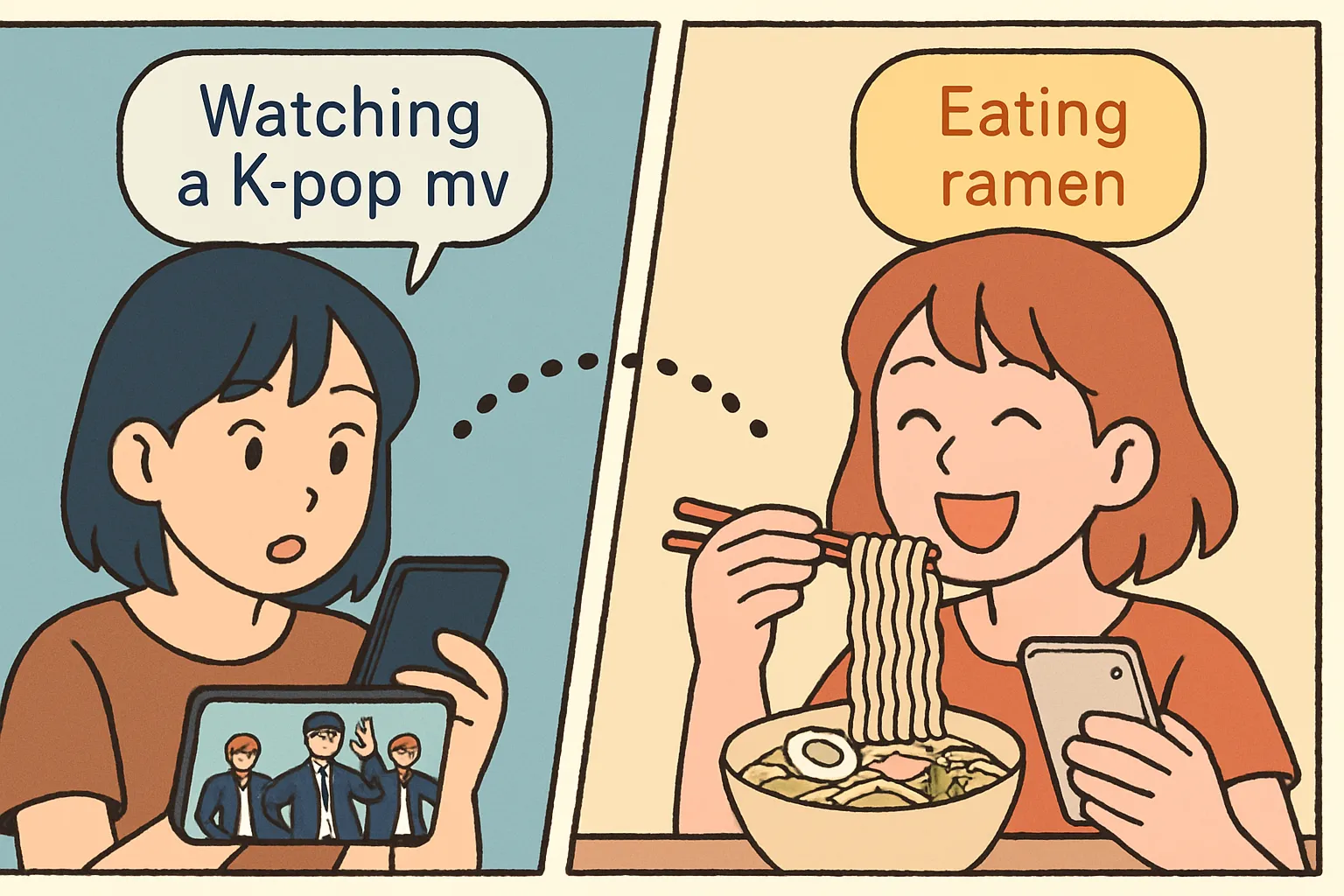From Nervous Wreck to “Nailed It!” in Korean 🤩
Hello! This is Maeil Hangeul (매일한글), here to upgrade your Korean skills! 🚀
Have you ever had to give a big, important presentation? Your heart is pounding, your palms are sweaty, but in the end… you absolutely crush it! That feeling of relief and pride is universal. Today, we’re going to learn how to express that exact emotional journey in natural, fluent Korean.
Nowadays in Korea, from competitive school projects to high-stakes business pitches in dramas like “Start-Up,” the pressure to perform is real. But so is the incredible feeling of success that follows! These expressions will help you share your wins just like a native speaker. Let’s dive in!
Core Expressions for Your Big Win!
Here are four key phrases that will take you from pre-presentation jitters to post-presentation glory.
1. 너무 긴장돼요 (Neomu ginjangdwaeyo)
- Romanization: [Neomu ginjangdwaeyo]
- English Meaning: I’m so nervous.
- Detailed Explanation: This is your go-to phrase for expressing nervousness or tension. 긴장되다 (ginjangdoeda) is the verb “to be nervous,” and 너무 (neomu) means “so” or “very.” You can use this right before an exam, an interview, or, of course, a big presentation. It’s a very common and natural way to share your feelings.
-
💡 Pronunciation Tip:
The ‘되’ in ‘돼요’ can be tricky. It’s a combination of the vowels ‘ㅗ(o)’ and ‘ㅣ(i)’, creating a ‘oe’ sound similar to the “we” in “wet.” Practice saying it quickly: ‘o-e’ -> ‘oe’. So, it’s not dwa-yo but [dwae-yo].
2. 드디어 해냈어요! (Deudieo haenaesseoyo!)
- Romanization: [Deudieo haenaesseoyo!]
- English Meaning: I finally did it! / I pulled it off!
-
Detailed Explanation: This is the ultimate victory cry! 해내다 (haenaeda) is a powerful verb that means to accomplish or achieve something, especially after difficulty. Adding 드디어 (deudieo), which means “finally,” emphasizes the struggle you overcame. It’s packed with a sense of achievement.
-
💡 Pronunciation Tip:
Notice the double ‘ss’ (ㅆ) in 해냈어요 (haenaesseoyo). This is a tense consonant sound. To make this sound, tense the back of your tongue and push the air out forcefully without a puff of air, like the ‘ss’ in “hiss.” It’s stronger and tighter than a single ‘ㅅ(s)’.
3. 속이 후련해요 (Sogi huryeonhaeyo)
- Romanization: [Sogi huryeonhaeyo]
- English Meaning: I feel so relieved. (Literally: My inside feels refreshed/unburdened.)
-
Detailed Explanation: This beautiful expression perfectly captures the feeling of a weight being lifted off your shoulders. 속 (sok) means “inside” (your stomach or mind), and 후련하다 (huryeonhada) means to feel refreshed or relieved after a burden is gone. It’s more emotional than just saying “I’m relieved.”
-
💡 Pronunciation Tip:
The ‘ㅎ(h)’ sound in 후련해요 (huryeonhaeyo) is often soft and breathy, almost like a sigh of relief itself! Don’t make it a hard ‘h’ sound like in “hat.” Think of it as a light puff of air.
4. 정말 뿌듯해요 (Jeongmal ppudeuthaeyo)
- Romanization: [Jeongmal ppudeuthaeyo]
- English Meaning: I feel so proud / satisfied.
-
Detailed Explanation: This isn’t about arrogant pride, but the warm, satisfying feeling you get from your own hard work paying off. 뿌듯하다 (ppudeuthada) describes the sense of self-satisfaction and fulfillment after achieving something meaningful. 정말 (jeongmal) means “really” or “truly.”
-
💡 Pronunciation Tip:
The first syllable, 뿌 (ppu), uses the tense consonant ‘ㅃ(pp)’. Like ‘ㅆ(ss)’, you make this sound without aspiration (a puff of air). To practice, try saying “stop by” and focus on the ‘p’ sound in ‘stop’. It’s that same tight, unaspirated sound. It’s different from the airy ‘ㅍ(p)’ in ‘pizza’ (피자).
Example Dialogue
Let’s see how these expressions work in a real conversation between two colleagues, Minjun and Sora.
A: 민준 (Minjun): 소라 씨, 발표 드디어 끝났네요! 시작하기 전에 너무 긴장됐어요.
Sora, the presentation is finally over! I was so nervous before starting.
B: 소라 (Sora): 정말 잘했어요, 민준 씨! 어려운 주제였는데 드디어 해냈네요!
You did a great job, Minjun! It was a difficult topic, but you finally pulled it off!
A: 민준 (Minjun): 감사합니다. 이제 끝나니까 속이 다 후련해요.
Thank you. Now that it’s over, I feel so relieved.
B: 소라 (Sora): 밤새 준비했잖아요. 정말 뿌듯하겠어요.
You prepared for it all night. You must feel so proud.
Culture Tip & K-Drama Connection
In Korea’s fast-paced work and academic culture, presentations (known as 발표, balpyo) are a huge deal. Success is often celebrated as a team, leading to a 회식 (hwesik, company dinner) to share the feeling of accomplishment.
You’ll see this emotional arc constantly in K-dramas! Think of the characters in ‘Itaewon Class’ or ‘Start-Up’ facing down powerful investors. The moment they finish their pitch, the mix of relief (후련하다) and pride (뿌듯하다) is a key emotional payoff for the viewer. Using these words shows you don’t just know Korean; you understand the culture of hard work and shared success that comes with it. When you use 해냈어요!, you’re channeling that main character energy!
Let’s Practice!
Ready to test your new vocabulary?
- Fill in the blank:
You just passed a very difficult exam you studied for all month. How do you feel?
“시험에 합격했어요! 아, 정말 _______________. (뿌듯해요 / 긴장돼요)”
(I passed the exam! Ah, I feel so _______________.) -
Your Turn!
Think of something difficult you accomplished recently. It could be big or small! Write a sentence in the comments below using 드디어 해냈어요!
You’ve learned some amazing expressions today to share your successes. Don’t be shy—celebrate your wins, big and small!
Now it’s your turn. Leave a comment using one of today’s expressions! We’d love to hear what you’ve achieved! 👍






